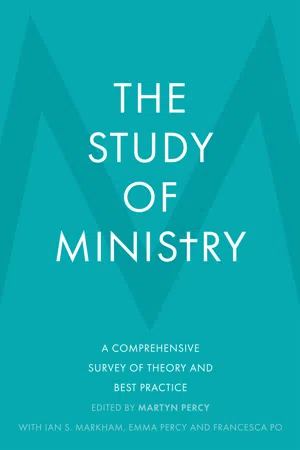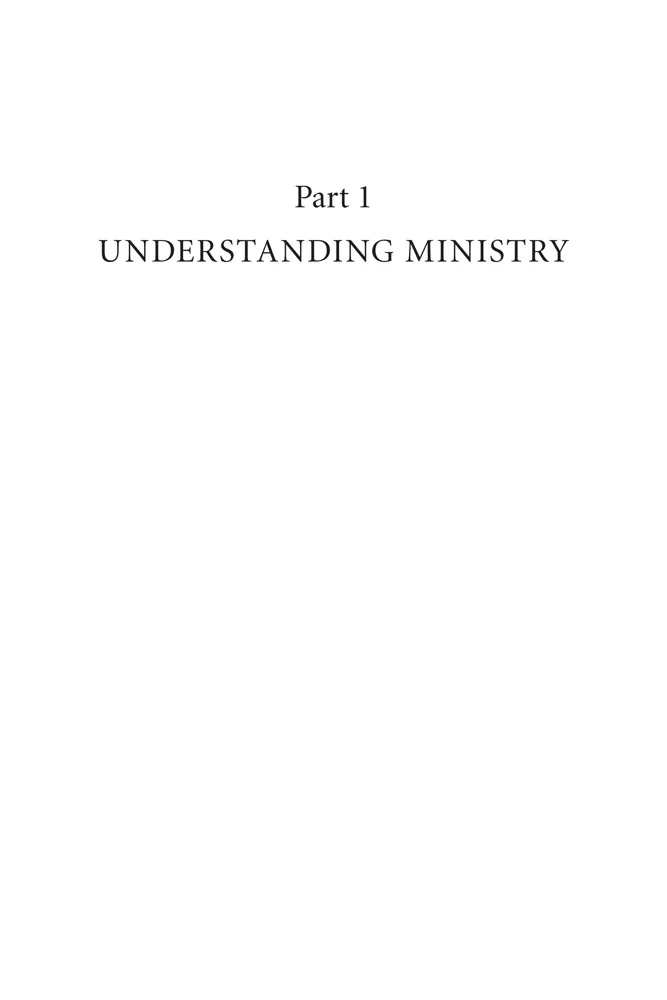
eBook - ePub
The Study of Ministry
A Comprehensive Survey of Theory and Best Practice
This is a test
- English
- ePUB (mobile friendly)
- Available on iOS & Android
eBook - ePub
The Study of Ministry
A Comprehensive Survey of Theory and Best Practice
Book details
Book preview
Table of contents
Citations
About This Book
The Study of Ministry is a comprehensive guide to the theory and practice of ministry that attends to historical sources, the social sciences, pastoral theology, ecclesiology and cultural studies. The book argues for the study of ministry to be taken seriously as an aspect of ecclesiology and pastoral theology, providing a stimulating resource both for practising ministers and for all those training for ministry in a range of denominations.
Frequently asked questions
At the moment all of our mobile-responsive ePub books are available to download via the app. Most of our PDFs are also available to download and we're working on making the final remaining ones downloadable now. Learn more here.
Both plans give you full access to the library and all of Perlego’s features. The only differences are the price and subscription period: With the annual plan you’ll save around 30% compared to 12 months on the monthly plan.
We are an online textbook subscription service, where you can get access to an entire online library for less than the price of a single book per month. With over 1 million books across 1000+ topics, we’ve got you covered! Learn more here.
Look out for the read-aloud symbol on your next book to see if you can listen to it. The read-aloud tool reads text aloud for you, highlighting the text as it is being read. You can pause it, speed it up and slow it down. Learn more here.
Yes, you can access The Study of Ministry by Emma Percy,Ian Markham, Martyn Percy,Ian Markham,Emma Percy,Francesca Po in PDF and/or ePUB format, as well as other popular books in Theology & Religion & Christian Ministry. We have over one million books available in our catalogue for you to explore.
Information
Topic
Theology & ReligionSubtopic
Christian Ministry
1
The developing philosophy of ministry
john fitzmaurice
Context – from Reformation to postmodernism
Ministry is peculiar and particular. Those being licensed for ministry in the Church of England are reminded in the preface of the Declaration of Assent that they are to proclaim the faith afresh in each generation – that the ministry of the Church is uniquely expressed in its context, and reimagined for every new context. Thus ministry seeks to be responsive to the particularity of its situation. But what are the factors or criteria that shape that ministry, and how are those involved in the tasks of ministry to best exercise their ministries? What are the deep signposts that guide those who exercise ministry in the name of the Church? In this ever-changing and dynamic task, what is our philosophy of ministry to be?
It’s important to recognize that the Church’s understanding of ministry has always been contested. Indeed one of the great motivations for both the English and Continental Reformations was the reform of ministerial practice. The subsequent rewritings of the Anglican Ordinal witness to an attempt to articulate a fresh and reinvigorated ministerial vision. Clericalism and the cultic and sacerdotal practices that surrounded it is replaced with a much clearer vision of the relationship between priest and people. Webster suggests that the trajectory of the post-Reformation ordinals was away from a sacerdotal model of priesthood towards a more didactic one, and indeed that Cranmer’s reworking of the eucharistic rite was not an exclusion of sacrificial understanding, but rather a radical reworking of it.1 He suggests that the motivation for this was a move away from an understanding of the role of the priest as a mediator of sacrifice to that of a minister of word and sacrament, refocusing the salvific sacrificial action on that of Christ.2 This shift of emphasis was not uncontroversial, causing some to question the validity of Anglican orders and suggesting a breech in apostolicity. For Evangelicals the fear was that that revised emphasis was not reformed enough. Such tensions lingered on until they were reignited in the revivals of the nineteenth centuries, Anglo-Catholics seeking to re-establish a clear link between Anglican orders and the historic Church, notably the early Church, while Evangelicals sought faithfulness to Scripture and an openness to the Spirit. In 1896 a further dynamic was added by Pope Leo XIII’s declaration in Apostolicae Curae that Anglican orders were to be considered null and void.
The twentieth century, particularly its latter half, saw a renewed emphasis on the ministry of the whole Church and alongside it a search to articulate a theology of ordination within that wider context, something that Webster suggests tended towards functionalism.3 The last few decades of the twentieth century within the Church of England were coloured by the extensive and passionate debates surrounding the ordination of women as priests.
So within the Church, the nature of ministry has always been contested, and that continues into the twenty-first century as we shall see. However, that societal context in which ministry is exercised has also changed dramatically. The contemporary context, which can variously be described as postmodern, secularist, post-Christian and even post-secular, has significant and lasting implications for how the Church understands and exercises its ministry, and it is essential that the Church deeply understands that context if it is to minister effectively to it.
Postmodernism is, of course, characterized by its rejection of metanarrative – there is no objective truth because all meaning is socially constructed – a key consequence of which is a relativistic approach to moral and ethical issues. How the Church, rooted as it is in a clear metanarrative, responds to such a challenge is a fundamental question as it tries to develop a philosophy of ministry.
Foundational to our understanding of both postmodernism and secularism is a recognition of their complexity. J. K. A. Smith, drawing on Taylor,4 points to the paradox of this, noting that proponents of secularism view it as neutral, unbiased, objective, rational and a-religious, while the reality is that secularism is an alternative metanarrative that seeks to exclude religious voices from the public square. The problem as Smith points out is that life is difficult and complex and secularist accounts don’t help us understand it. Increased rationality does not lead to an abandonment of religion, as religion actually handles complexity better, and thus, Smith suggests, ultimately renders secularism untenable and unsustainable. David Lyall writes:
In the midst of complexity and ethical ambiguity the pastoral task is not to provide easy answers or to lead people to believe that such answers exist (if indeed they ever did). Rather, the pastoral task is to ‘hold’ people in the midst of the complexity and ambiguity and to help them to catch a vision or be grasped by a grace which is more profound than the easy answer.5
The exclusion of religion, and with it transcendence, from the public square leaves a vacuum, which Smith and Taylor both suggest is filled with a creation of secularism, namely exclusive humanism. This is characterized not simply by what is left when religious discourse and the notion of transcendence is removed from the public square, but by the creation of a substitute. However, both Smith and Taylor suggest that the remaining immanent framework is subject to what they describe as ‘cross-pressure’ from the complexity of postmodernity. The postmodern marketplace of ideas contains many alternative narratives of meaning and significance, and thus both the exclusive humanism of secularity, and the faith of devout religious belief, are subject to an increased contestability. Thus, they claim, secularity changes belief rather than doing away with it – doubt becomes more common for the religious believer but also for the espoused atheist. The implications of this are significant as we grope our way towards a developing philosophy of ministry.
Postmodern ministry and secular discourse
The complexity of the contemporary context and the swirling morass of undifferentiated discourses of meaning and significance have challenged the Church in how it goes about its ministry. Whereas in pre-modern and modernist times any debates about the nature of ministry were largely internal to the Church and undertaken within the prevailing Christian metanarrative, with the onset of postmodernism the Church and its ministry has found itself, for better or for worse, engaging with ...
Table of contents
- Cover
- The Study of Ministry
- Contents
- Contributors
- Introduction
- Part 1 UNDERSTANDING MINISTRY
- 1 The developing philosophy of ministry
- Part 2 MODELS, METHODS AND RESOURCES
- 9 Global and ecumenical models of ministry
- Part 3 MINISTRY IN CHRISTIAN TRADITION
- 17 Scripture and ministry
- Part 4 STYLES OF CHRISTIAN MINISTRY
- 23 Roman Catholic pastoral theology
- Part 5 ISSUES IN CHRISTIAN MINISTRY
- 30 The challenge of preaching
- Conclusion
- Afterword
- Selected bibliography
- Further reading
- Copyright acknowledgements
- Index of names
- Index of subjects